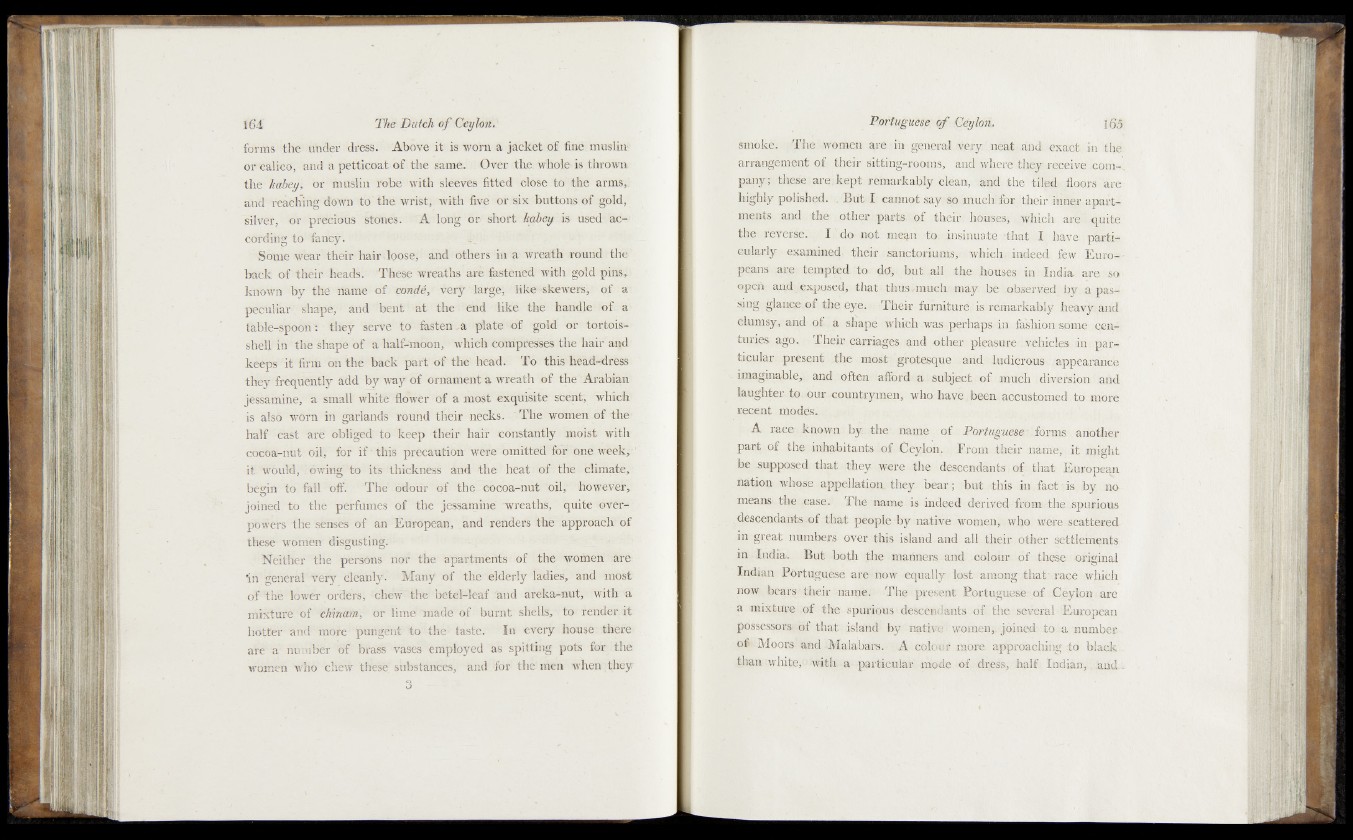
fbfms -the' ubder dress. Above it lsSOTfnafji jacket of fine muslin'
or'caliCo, and a |febticmtib£ tfee -game. ; .Over ■;tt^^irhole' is i thrown
br 'rnusHn robe’* with sleeves- fitted5 idbse to the arnasp
and reaching down to the wrist, "With five or.six buttons of ?g©ld,
"siivbt? 1 i f O m f e . AI long: ot> short hab&tf Is hsbdMiC^r’
cording to fancy.
Some wear their hair-.loose, I and others in a wreath■ round the
back of their -heads. These-Wreaths- are fastened with gold pins,.>
known by the name of conde, very • large, like skewers, of a
peculiar shape, and bent I a t : the end like th e handle of a
table-spoon: they serve to fasten -a plate .of gold or tortois-
shell in * the shape of a half-moon, which compresses the hair aqd
keeps-'if firm bn the- back p a rt of the head.1 To this'hekchdress
th ey 'fi^juehtly add b y way b f Ornament ^ Wteath "Atabiah
jb ^ f e ih e /" h smalt whiftrflower of a most extjuisite^s&^fit; which?
is also worn in garlands round their necks, a The women of the
half cast are obliged to keep their hair -constantly moist with
cocoa-nut oil, for if this precaution Were omitted foie' one week,
it would, owing to its thickness and the heat of the climate,
begin to. fall off. The odour I of the cocoa-nut oil, however,
joined,'to the perfumes of the jessamine -wreaths, quite ovei-
powers the senses of an European, and renders the approach of
these' women disgusting. - *
/ Neither -the persons nOr the -apartments of the women are
?in general very cleanly. Many of the elderly ladies, and most
of the lower orders, chew" the betel-leaf "and areka-nut, with a
mixture of chiming or lime made of burnt' shells, to render; it
hotter and more pungent:'to“-the- taste: In every house there
are a number of brass vases employed as spitting pots for the
women who chew these; substances, and for fhtpxieiifuwllen they
3
snioke. The -women are in general very neat and exact in the
arrangement of their sitting-rooms, and where they receive com-,
pany; these, are:kept remarkably clean, and -the filed floors are
highly polished. . But I cannot say so.-much, for their inner apartments.
and the other parts, of their houses;? which are quite
the-reverse. I do not . m e p to. insinuate rthat-. I have particularly
examined, their sanctoriums, ; which indeed few Europeans
are tempted, to. do, but all the houses' in India- are so
opep and exposed;,,;'.,that thus,much may. .be observed by a pas-
sing.,g-laHG;ei©f the eye. - Their furniture is remarkably heavytand
elutmsy.;' and fif,,a -shape whfchswampethapsyin faishaoOmbme .:qe®4i
tuiies| ago. Their carriages and other pleasure vehicles in particular.
.present- ffhe most *. gi'otesqjiemand/' ludierousiYappearabce
imaginable,* and - often a-jib-rd, a t sulajecl . disssef^iomband
lhughter,i@iiomaiGountrymen, who have, becmaceu^tpnmdpmmore
recent .modp&Pp.
A race^knowni byr,the' name of Djrtugu.es&:I,forms. another
pant of the inhabitants of .Ceylon. From their name, it might
he .supposed, that they. -Were the descendants: of that fifusopean
. patio© whosip appellation* they - bear -; ?but phis -im £a©t ris.iby no
means-., the^case,' Tbh^feiafme-ix indeed derived-frorEKphe,.spurious
.^escendajlt^of that people-by; native womenpwhQ ';Were<sScaft©Eed.
in gpeat numbers over this island and all their other settlements
in jj India, Butbbofh |h e manners and colour of these original
Indian Portuguese are-now equally lost among th at-- race which
How bears then name. The present Eortuguehelof Ceylon.- are
a mixtuie of the spurious descendants of. the,-several European
possessors of that island by native womeiap joined to a number,
of Moors, and Malabars. A colour more approaching td black
than white,- with a particular; mode-of. dress,. half Indian, hand;